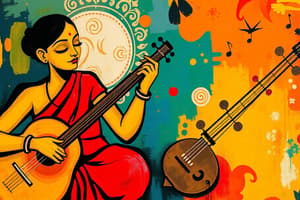Podcast
Questions and Answers
What does 'Rasa' refer to?
What does 'Rasa' refer to?
- Musical teacher
- Style of performance
- Ancient Indian aesthetic sensibilities (correct)
- Rhythmic framework
What is the embodiment of rhythm in dance and the dramatic expression of story and mood through dance and song called?
What is the embodiment of rhythm in dance and the dramatic expression of story and mood through dance and song called?
Sangita
Which of the following are influences on Hindustani music? (Select all that apply)
Which of the following are influences on Hindustani music? (Select all that apply)
- British colonialism (correct)
- Indian classical influences
- American jazz
- Persian influences (correct)
What is Hindustani music known for?
What is Hindustani music known for?
What characterizes Carnatic music?
What characterizes Carnatic music?
What is a 'Gharana'?
What is a 'Gharana'?
What does 'Guru' mean in the context of music?
What does 'Guru' mean in the context of music?
What does 'Shishya' refer to?
What does 'Shishya' refer to?
What is a 'Raga'?
What is a 'Raga'?
What does 'Tala' refer to in Hindustani music?
What does 'Tala' refer to in Hindustani music?
What is the 'Alap' in a raga?
What is the 'Alap' in a raga?
What is the acoustic method called that has rasa?
What is the acoustic method called that has rasa?
What is an instance of tala referred to as?
What is an instance of tala referred to as?
What is 'Theka' in Hindustani music?
What is 'Theka' in Hindustani music?
Study Notes
Concepts in Hindustani Classical Music
- Rasa: Represents ancient Indian aesthetic sensibilities, often referred to as the "flavor" of music, influencing emotional expression in performances.
- Sangita: A holistic concept that combines rhythm, dance, and dramatic storytelling, embodying the mood and emotion conveyed through musical expression.
Musical Styles and Influences
- Hindustani Music: Originates from North India, characterized by classical techniques and lengthy performances featuring instruments like sitar, tabla, sarod, and santoor.
- Carnatic Music: Associated with South India, particularly Tamil and Telugu cultures, it focuses on melodic compositions and features instruments such as vina, mridangam, violin, and ghatam.
Educational Frameworks
- Gharana: Refers to a traditional school of music that is linked to notable performers and distinct regional styles, emphasizing the lineage and legacy of music.
- Guru: Signifies a teacher in the musical tradition, traditionally characterized by a slow and rigorous teaching approach.
- Shishya: Denotes the student within the musical heritage, responsible for learning and preserving the art form.
Musical Elements
- Raga: Serves as the melodic framework in Hindustani music, providing a modal structure around which compositions are created.
- Tala: Functions as the rhythmic framework, organizing musical time and elements within the performance.
- Alap: The introductory section of a raga performance, characterized by the absence of percussion, focusing on melodic exploration.
- Raag: A specific acoustic configuration that embodies rasa, including a set of guidelines for performers to navigate improvisation and expression.
- Taal: An instance of tala, representing specific rhythmic patterns used in performances.
- Theka: Refers to the act of keeping time in Hindustani music, ensuring rhythm is maintained throughout the performance.
Studying That Suits You
Use AI to generate personalized quizzes and flashcards to suit your learning preferences.
Description
Explore the fascinating concepts of North Indian Hindustani classical music through flashcards. Learn essential terms like Rasa, Sangita, and the influences on this rich musical tradition. Perfect for students and enthusiasts looking to deepen their understanding of Hindustani music.



